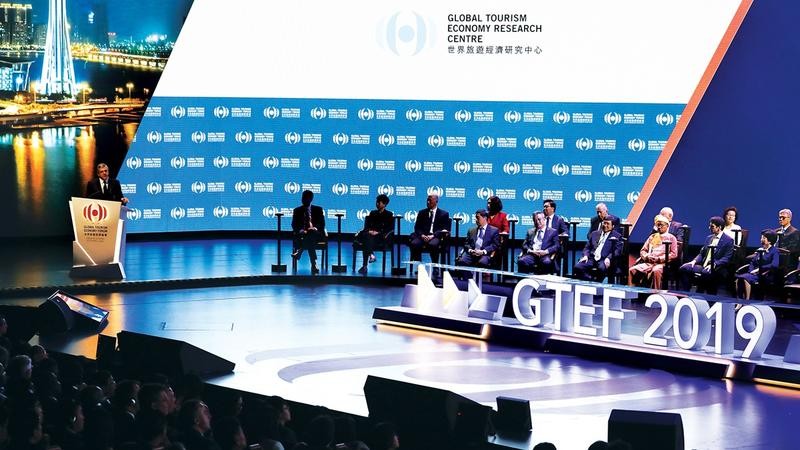2019-10-15
Luo Weiteng

Riding high on the goals and undertakings of the high-profile Belt and Road Initiative and the Guangdong-Hong Kong-Macao Greater Bay Area mega plan, Macao, with the “one country, two system” principle as its major advantage, is sparing no effort to consolidate its position as a tourist magnet. The city underscored this vision when the eighth session of the Global Tourism Economy Forum (GTEF) kicked off in Macao on Monday. Hosted by Macao’s Secretariat for Social Affairs and Culture, the two-day event is promoting international dialogue with the theme “Tourism and Leisure: Roadmap to a Beautiful Life” — a proactive response to “the China Dream” as outlined by President Xi Jinping, who stressed: “People’s yearning for a good and beautiful life is the goal for us to strive for.” This year, the event takes on a new significance as Macao celebrates its 20th anniversary of its return to the motherland. In his welcoming address, former Macao chief executive Edmund Ho Hau-wah, who is now vice-chairman of the National Committee of the Chinese People’s Political Consultative Conference and chairman of the GTEF, said the event stands as a “once-in-a-lifetime chance” for Macao to be identified as one of the four core cities and core engines for driving development in the region, together with its counterparts Hong Kong, Shenzhen and Guangzhou, in the Greater Bay Area Outline Development Plan, which the State Council released in February. The principle of “one country, two systems” offers Macao, where East meets West, the best of both worlds. The principle enables the city to keep its way of life and freedom while tapping the opportunities and benefits arising from reuniting with the Chinese mainland, Macao Chief Executive Fernando Chui Sai-on said. “For years, tourism has long been the pillar of Macao’s economy,” Chui said. Since the establishment of the Macao SAR government in 1999, the tourism industry has been on a tear in the territory. Visitor arrivals to Macao have quadrupled, and the number of hotel rooms has tripled, he said. Zurab Pololikashvili, who is in the second year of a four-year term as secretary-general of the World Tourism Organization, stressed the forum charts its course of making Macao “the next Davos” for visitors — a step closer to the promise made at last year’s event. This year, Argentina and Brazil are featured as the partnered countries of the event. Argentine Tourism Minister Gustavo Santos, who traveled thousands of kilometers from the other side of the world to Macao, said he believes tourism could go beyond the geographical distance and connect countries and regions together. “Argentina, Brazil and China are closer than ever before, as the three great nations share the same rhythm,” he said. Zhang Xu, vice-minister of culture and tourism, also lauded the continued potential of tourism in Macao. “As the growing rhetoric and mentality of protectionism today cast a shadow over the globe, the tourism industry, with its inherent spirit of openness and collaboration, has what it takes to be one of the most prominent growth engines for the global economy. It is high time for Macao to make a difference,” he said. The forum is billed as one of the leading annual events in the global tourism calendar and the single most representative non-governmental tourism platform in China. Since its inception in 2012, it has attracted more than 10,783 participants from 89 countries and regions, including delegations from 147 provinces and cities from the Chinese mainland, and invited 570 of the world’s most influential business leaders, decision-makers and academics to share their insights. In conjunction with this year’s GTEF, China Daily will host a panel discussion for the eighth consecutive year. The event will bring together distinguished academics, policymakers and industry heavyweights to share their insights on how a globally competitive cluster of metropolises in the making under the grand plan of the Guangdong-Hong Kong-Macao Greater Bay Area could be turned into a world-class tourism destination and bring dramatic changes to the regional tourism market. The dialogue, titled “Greater Bay Area Tourism Development: An Integrated Approach for Well-Being”, will be held today in Macao.